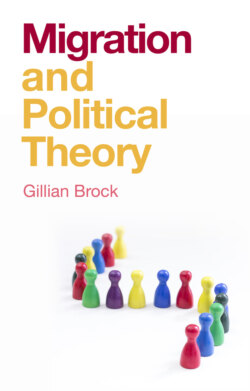Читать книгу Migration and Political Theory - Gillian Brock - Страница 18
2.1.2 Freedom of association
ОглавлениеChristopher Wellman’s prominent argument for strong rights to restrict immigrants relies crucially on the importance of freedom of association. He argues that legitimate states (i.e. ones that respect basic moral rights) have a right to political self-determination and that freedom of association is a crucial component of self-determination. Freedom of association entails that states also have a right to refrain from associating and so a right to deny prospective immigrants entry to their territory. In short, a state has the right to exclude those with whom it does not wish to associate.
The central arguments proceed through analogies with the importance that freedom of association has for individuals and groups. So consider how important freedom of association is to most people. We commonly think that you should be free to decide who your friends are and, if you choose to marry someone, who that will be. Such freedoms are central rights that are integral to living a self-determining, autonomous life. Consider also how important freedom of association is to clubs. They have the right to decide who should be a member and on what terms. Similarly, states should have such freedoms that are just as crucial to their rights to be self-determining. Imagine if they had no control over which migrants could join their community and so were denied freedom of association. This would deprive them of a crucial aspect of the right to determine the shape and character of their community and would undermine their abilities to be self-determining. The right to freedom of association also includes the right to refuse to associate with others. Legitimate political states may refuse to associate with immigrants who they do not wish to join their political communities, just as you have a right to refuse to associate with people whom you don’t wish to befriend. So, in short, just as individuals may permissibly choose whom (if anyone) to befriend or marry and clubs may determine who should be a member, groups of fellow citizens are entitled to determine whom (if anyone) to admit to their country and to whom entry should be denied.
In addition to the case Wellman makes for self-determination grounded in the importance of freedom of association, he also argues against proponents of more open borders. For instance, while egalitarians make a powerful case for being concerned with the global disadvantaged, there is insufficient reason for that concern to take the form of open borders. Opening borders is neither the only nor even the best way to assist the global poor. These are issues I consider further in later sections.
Many of Wellman’s arguments proceed by analogy with how freedom of association operates for individuals and small groups. However, one might challenge whether we can infer anything about the state from those examples. In the case of friendships, marriages, or religious associations, we have intimate or expressive associations in which freedom of association might matter a great deal (Fine 2010: 353). However, with states we have qualitatively different kinds of groups. In the case of states, freedom of association does not matter in the same kind of fundamental way and so cannot carry the argumentative burden required to exclude prospective immigrants.
One way to deepen the argument in response to such concerns might be to argue that there is something special about our association with others, namely in what we have created together and to which we therefore have a right. Ryan Pevnick’s arguments might be construed in this light.
